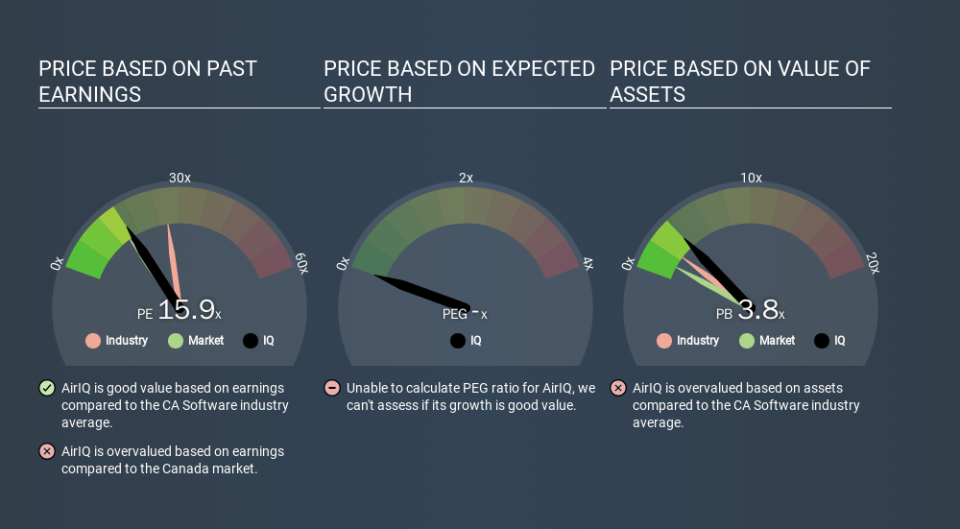A Rising Share Price Has Us Looking Closely At AirIQ Inc.'s (CVE:IQ) P/E Ratio

It's great to see AirIQ (CVE:IQ) shareholders have their patience rewarded with a 35% share price pop in the last month. Looking back a bit further, we're also happy to report the stock is up 61% in the last year.
Assuming no other changes, a sharply higher share price makes a stock less attractive to potential buyers. While the market sentiment towards a stock is very changeable, in the long run, the share price will tend to move in the same direction as earnings per share. So some would prefer to hold off buying when there is a lot of optimism towards a stock. One way to gauge market expectations of a stock is to look at its Price to Earnings Ratio (PE Ratio). A high P/E ratio means that investors have a high expectation about future growth, while a low P/E ratio means they have low expectations about future growth.
See our latest analysis for AirIQ
How Does AirIQ's P/E Ratio Compare To Its Peers?
AirIQ's P/E of 15.89 indicates relatively low sentiment towards the stock. If you look at the image below, you can see AirIQ has a lower P/E than the average (26.7) in the software industry classification.
Its relatively low P/E ratio indicates that AirIQ shareholders think it will struggle to do as well as other companies in its industry classification. Since the market seems unimpressed with AirIQ, it's quite possible it could surprise on the upside. If you consider the stock interesting, further research is recommended. For example, I often monitor director buying and selling.
How Growth Rates Impact P/E Ratios
Probably the most important factor in determining what P/E a company trades on is the earnings growth. If earnings are growing quickly, then the 'E' in the equation will increase faster than it would otherwise. That means even if the current P/E is high, it will reduce over time if the share price stays flat. And as that P/E ratio drops, the company will look cheap, unless its share price increases.
AirIQ's earnings made like a rocket, taking off 95% last year. Having said that, the average EPS growth over the last three years wasn't so good, coming in at 8.7%.
Remember: P/E Ratios Don't Consider The Balance Sheet
One drawback of using a P/E ratio is that it considers market capitalization, but not the balance sheet. So it won't reflect the advantage of cash, or disadvantage of debt. The exact same company would hypothetically deserve a higher P/E ratio if it had a strong balance sheet, than if it had a weak one with lots of debt, because a cashed up company can spend on growth.
Such spending might be good or bad, overall, but the key point here is that you need to look at debt to understand the P/E ratio in context.
So What Does AirIQ's Balance Sheet Tell Us?
With net cash of CA$1.8m, AirIQ has a very strong balance sheet, which may be important for its business. Having said that, at 24% of its market capitalization the cash hoard would contribute towards a higher P/E ratio.
The Verdict On AirIQ's P/E Ratio
AirIQ has a P/E of 15.9. That's higher than the average in its market, which is 14.7. The excess cash it carries is the gravy on top its fast EPS growth. So based on this analysis we'd expect AirIQ to have a high P/E ratio. What is very clear is that the market has become more optimistic about AirIQ over the last month, with the P/E ratio rising from 11.8 back then to 15.9 today. For those who prefer to invest with the flow of momentum, that might mean it's time to put the stock on a watchlist, or research it. But the contrarian may see it as a missed opportunity.
Investors have an opportunity when market expectations about a stock are wrong. People often underestimate remarkable growth -- so investors can make money when fast growth is not fully appreciated. Although we don't have analyst forecasts shareholders might want to examine this detailed historical graph of earnings, revenue and cash flow.
Of course, you might find a fantastic investment by looking at a few good candidates. So take a peek at this free list of companies with modest (or no) debt, trading on a P/E below 20.
If you spot an error that warrants correction, please contact the editor at editorial-team@simplywallst.com. This article by Simply Wall St is general in nature. It does not constitute a recommendation to buy or sell any stock, and does not take account of your objectives, or your financial situation. Simply Wall St has no position in the stocks mentioned.
We aim to bring you long-term focused research analysis driven by fundamental data. Note that our analysis may not factor in the latest price-sensitive company announcements or qualitative material. Thank you for reading.

 Yahoo Finance
Yahoo Finance 
